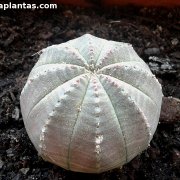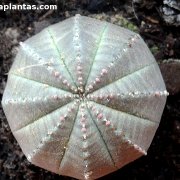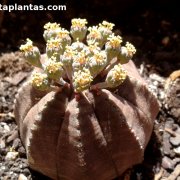Care of the succulent plant Euphorbia obesa or Baseball Plant |
|
The genus Euphorbia, family Euphorbiaceae, includes 2,000 species of succulents, trees, shrubs, and herbaceous plants of cosmopolitan distribution. Some species are: Euphorbia obesa, Euphorbia viguieri, Euphorbia meloformis, Euphorbia lomelii, Euphorbia bubalina, Euphorbia tithymaloides, Euphorbia milii, Euphorbia mammillaris, Euphorbia leucocephala, Euphorbia lactea, Euphorbia ingens, Euphorbia inermis, Euphorbia horrida, Euphorbia heptagona, Euphorbia handiensis, Euphorbia grandicornis, Euphorbia flanaganii, Euphorbia enterophora, Euphorbia enopla, Euphorbia echinus, Euphorbia cotinifolia, Euphorbia coerulescens, Euphorbia characias, Euphorbia candelabrum, Euphorbia canariensis, Euphorbia pulcherrima, Euphorbia resinifera, Euphorbia regis-jubae, Euphorbia royleana, Euphorbia trigona, Euphorbia bivonae, Euphorbia rigida, Euphorbia handiensis, Euphorbia balsamifera. Common names: Baseball Plant, Golf ball, Living Baseball, Sea Urchin, Gingham. This species is native to South Africa. They are small succulent plants with slow growth and globular body that reach 20 cm (7.87") in height. They are dioecious plants without leaves, without thorns and grayish green with mauve or light green lines. The flowers are very small and appear at the apex of the plant. They bloom in spring and early summer. To obtain seeds you have to cultivate female plants and male plants to achieve pollination. Baseball Plant is used in pots for terraces and patios, in greenhouses and as a houseplant. In subtropical regions it's grown on rockeries and in cactus and succulent gardens. Euphorbia obesa needs semi-shade exposure and warm weather. It does not resist temperatures below 10 ºC (50 ºF). The soil can be a mixture of 50% blond peat, 25% coarse sand, and 25% leaf mulch or topsoil; It can also be a commercial substrate for cacti. Water moderately in spring and summer waiting until the soil has dried; reduce watering in autumn and do not water in winter. Living Baseball does not need fertilizers or pruning. Euphorbia obesa is sensitive to the excess of irrigation that Botrytis produces; if the heat is very intense it can be attacked by mealybugs and aphids. Sea Urchin propagates by seeds sown in spring in sandy substrate. It does not usually produce suckers but if it does they can be separated in spring. |
Images of the succulent plant Euphorbia obesa or Baseball Plant |
Find plants
Euphorbia obesa or Baseball Plant | Care and Growing
© 2026 FavThemes


